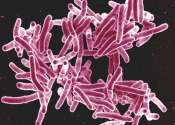Experimental vaccine targets portions of the flu virus that don't change
Duke researchers have opened a new avenue in the attack against influenza viruses by creating a vaccine that encourages the immune system to target a portion of the virus surface that is less variable.
3 hours ago
0
1









